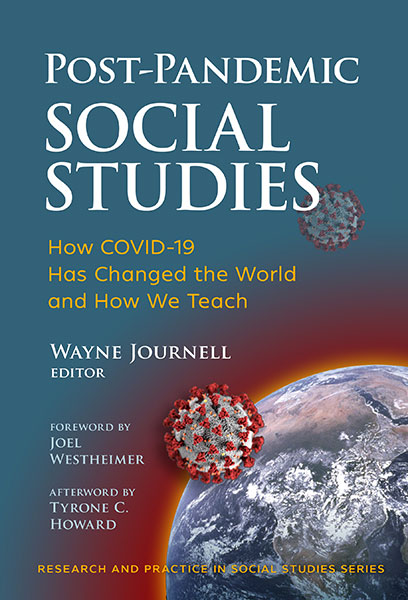Professors: Request an Exam Copy
Print copies available for US orders only. For orders outside the US, see our international distributors.
Edited by: Wayne Journell
Foreword by: Joel Westheimer
Afterword by: Tyrone C. Howard
Publication Date: December 24, 2021
Pages: 288
Series: Research and Practice in Social Studies Series

COVID-19 offers a unique opportunity to transform the K–12 social studies curriculum, but history suggests that changes to the formal curriculum will not come easily or automatically. This book was conceived in the space between the dismantling of our old way of life and the anticipation of what comes next. The authors in this volume—leading voices in social studies education—make the case that COVID-19 has exposed deficiencies in much of the traditional narrative found in textbooks and state curriculum standards, and they offer guidance for how educators can use the pandemic to pursue a more justice-oriented, critical examination of contemporary society. Divided into two sections, this volume first focuses on how elementary and secondary educators might teach about the pandemic, both as a contentious public issue and as a recent historical event. The second section asks teachers to reconsider many long-standing aspects of social studies teaching and learning, from content and instructional approaches to testing.
Book Features:
Wayne Journell is professor and coordinator of the Secondary Teacher Education Program and Secondary Social Studies Program at the University of North Carolina at Greensboro. He also is editor of Theory & Research in Social Education and has received two Exemplary Research in Social Studies Awards from the National Council for the Social Studies (NCSS). His books include Unpacking Fake News: An Educator's Guide to Navigating the Media with Students.
“Education has long been heralded as a key to addressing persistent inequality, stimulating social mobility, decreasing unemployment, teaching about sustainable living, strengthening democratic institutions, and reducing violence. But this book goes further than noting the importance of education for students’ social mobility. Taken together, the vision these chapters advance is one not satisfied with education that benefits individuals. They suggest, rather, the possibility of social studies curriculum and teaching that foregrounds issues of social justice, builds communal ties, and embraces and advances the habits and dispositions of democratic life.”
—From the Foreword by Joel Westheimer, professor, the University of Ottawa
“The collection of chapters in this book help to provide us a healing roadmap—a roadmap that explicitly names the challenges, emotions, and pain that many Americans have encountered historically and contemporarily. The authors in this work also provide us with critical and evidence-based directions, recommendations, resources, and hope for how we can move forward.”
—From the Afterword by Tyrone C. Howard, Pritzker Family Endowed Chair of Education, University of California, Los Angeles
"This book uniquely captures the issues so many social studies educators are wrestling with right now. It unpacks the age-old question: How can we create a world we all want to live in? A must-read for any social studies educator."
—Stefanie Wager, president, National Council for the Social Studies (2020-2021)
“This book is a must-read for every social studies educator to help us process the global pandemic and how it has irrevocably changed every aspect of our profession.”
—Amanda E. Vickery, associate professor, University of North Texas
Contents
Foreword ix
Joel Westheimer
Preface xiii
Introduction 1
Wayne Journell
PART I: TEACHING ABOUT THE COVID-19 PANDEMIC 11
1. Putting COVID-19 Into Historical Context 13
Catherine Mas
2. Situating COVID-19 Within the Context of Death and Grief 28
Rebecca C. Christ, Bretton A. Varga, Mark E. Helmsing, and Cathryn van Kessel
3. How Should We Remember COVID-19? Designing Inquiry for Social–Emotional Learning 41
Carly Muetterties and Holly Wright
4. Examining COVID-19 with Young Learners: An Interdisciplinary Inquiry Design Model Approach 60
Lisa Brown Buchanan, Cara Ward, Tracy Hargrove, Amy Taylor, Maggie Guggenheimer, and Lynn Sikma
5. Ideology, Information, and Political Action Surrounding COVID-19 81
Christopher H. Clark
6. The Spatiality of a Pandemic: Deconstructing Social Inequality Through Social Inquiry 94
Sandra J. Schmidt
PART II: COVID-19 AND A CRITICAL EXAMINATION OF SOCIAL STUDIES TEACHING AND LEARNING 109
7. A Hill Made of Sand: COVID-19 and the Myth of American Exceptionalism 111
Wayne Journell
8. COVID-19 as a Symptom of Another Disease 125
Cathryn van Kessel
9. The Inclusion of Economic Inequality in the Social Studies Curriculum: Toward an Education for Participatory Readiness 137
Leonel Pérez Expósito and Varenka Servín Arcos
10. “Get Your Knee Off Our Neck!” Historicizing Protests in the Wake of COVID-19 151
Kristen E. Duncan and Amber M. Neal
11. Anti-Asian Violence Amid the COVID-19 Pandemic and Implications for Social Studies Education 163
Sohyun An and Noreen Naseem Rodríguez
12. Breathing Life Back Into Social Studies: Lessons from COVID-19 175
Jennifer Hauver
13. Taking Seriously the Social in Elementary Social Studies 187
Katherina A. Payne and Anna Falkner
14. Rethinking the American Value of Freedom in the Post–COVID-19 Social Studies Curriculum: An Altruism Perspective 200
Yun-Wen Chan and Ya-Fang Cheng
15. Global Learning for Global Citizenship Education: The Case of COVID-19 210
Sarah A. Mathews
16. Teaching Federalism: Investigating Federal vs. State Power in the Wake of a Pandemic 222
Karon LeCompte, Brooke Blevins, and Kevin R. Magill
17. What Do We Leave Behind? Assessment of Student Learning in Social Studies Post–COVID-19 236
Stephanie van Hover, Michael Gurlea, Tyler Woodward, David Hicks, and David Gerwin
Afterword 251
Tyrone C. Howard
About the Editor and Contributors 255
Index 258
Professors: Request an Exam Copy
Print copies available for US orders only. For orders outside the US, see our international distributors.